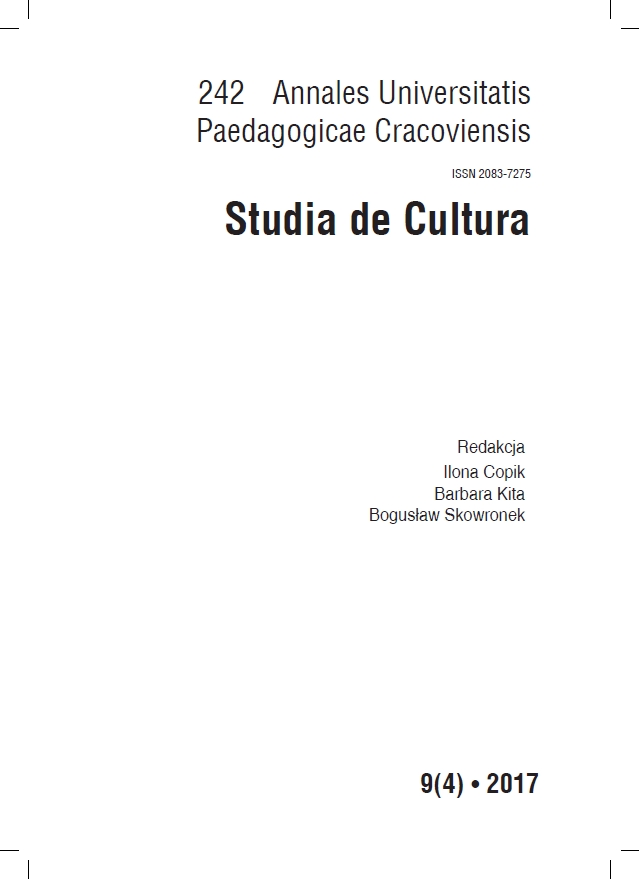Abstrakt
DOI 10.24917/20837275.9.4.5
W artykule przedstawiam trzy strategie, za pomocą których konstruowany jest krajobraz filmu nostalgicznego. Za jego cechę konstytutywną uznaję obecność zabiegu zapośredniczenia między tym, co obecne, a tym, co utracone. Wyprowadzając z literatury przedmiotu poświęconej nostalgii odmienne teoretyzacje tego zjawiska, zauważam, że w filmie nostalgiczna estetyzacja realizuje się nader często za pośrednictwem funkcji okna. W oparciu o wybrane przykłady filmu nostalgicznego, wyróżniam trzy sposoby, w jakich funkcja ta się przejawia. Nazywam je metaforycznie oknem-gablotą muzealną, oknem-zakurzoną szybę i oknem-portalem.
Memory windows - a nostalgia film landscape
In my article I present three strategies, in which landscape of nostalgia film is constructed. The main characteristic of this kind of landscape is mechanism of mediation between subject and object of loss. Starting from theories of nostalgia, I notice that aesthetics of nostalgia film is often produced by window figure. By referring to chosen examples of nostalgia film, I distinguish three main strategies, in which window figure is used as mediator between the present and the past. I metaphorically call them window-museum case, dusty windowpane and window-portal.
Bibliografia
Bartholeyns Gil. 2014. The Instant Past: Nostalgia and Digital Retro Photography. W Media and Nostalgia: Yearning for the Past, Present and Future. K. Niemeyer (red.). London: Palgrave Macmillan. 51–69.
Zobacz w Google Scholar
Benjamin Walter. 1975. Twórca jako wytwórca. W tegoż. Twórca jako wytwórca. H. Orłowski, J. Sikorski (przeł.). Poznań: Wydawnictwo Poznańskie. 93–95.
Zobacz w Google Scholar
Boym Svetlana. 2001. The Future of Nostalgia. New York: Basic Books.
Zobacz w Google Scholar
Cook Pam. 2005. Screening the Past: Memory and Nostalgia in Cinema. New York: Routledge.
Zobacz w Google Scholar
Deleuze Gilles. 2008. Kino. 1. Obraz-ruch 2. Obraz-czas. J. Margański (przeł.). Gdańsk: Słowo/obraz Terytoria.
Zobacz w Google Scholar
Holl Ute. 2014. Nostalgia. Tinted Memories and Cinematic Historiography: On Otto Preminger’s Bonjour Tristesse (1958). W Media and Nostalgia: Yearning for the Past, Present and Future. K. Niemeyer (red.). London: Palgrave Macmillan. 160–175.
Zobacz w Google Scholar
Jameson Fredric. 2011. Postmodernizm czyli logika kulturowa późnego kapitalizmu. M. Płaza (przeł.). Kraków: Wydawnictwo Uniwersytetu Jagiellońskiego.
Zobacz w Google Scholar
Le Sueur Marc. 1977. “Theory Number Five: Anatomy of Nostalgia Film: Heritage and Methods”. Journal of Popular Film ol. 6(2). 187–197.
Zobacz w Google Scholar
Lowenthal David. 1991. „Przeszłość to obcy kraj”. I. Grudzińska-Gross, M. Tański (przeł.). Res Publica nr 3. 6–22.
Zobacz w Google Scholar
Robinson Joanna. 2015. “Carol’s Production Designer Reveals How to Achieve Cate Blanchett Chic”. Vanity Fair. http://www.vanityfair.com/hollywood/photos/2015/11/carol-production-design [dostęp: 28.06.2017].
Zobacz w Google Scholar
Schauer Bradley. 2014. The Auteur Renaissance (1968–1980). W Cinematography. P. Keating (red.). New Jersey: Rutgers University Press Nilsen. 84–105.
Zobacz w Google Scholar
Schatz Thomas. 1991. The Family Melodrama. W Imitations of Life: A Reader on Film & Television Melodrama. M. Landy (red.). Detroit: Wayne State University Press. 118–134.
Zobacz w Google Scholar
Sprengler Christine. 2009. Screening Nostalgia: Populuxe Props and Technicolor Aesthetics in Contemporary American Film. New York–Oxford: Berghahn Books.
Zobacz w Google Scholar
Stewart Susan. 1993. On Longing: Narratives of the Miniature, the Gigantic, the Souvenir. Durham–London: Duke University Press.
Zobacz w Google Scholar
Zaleski Marek. 1996. Formy pamięci: o przedstawieniu przeszłości w polskiej literaturze współczesnej. Warszawa: Wydawnictwo Instytutu Badań Literackich.
Zobacz w Google Scholar

